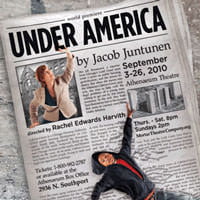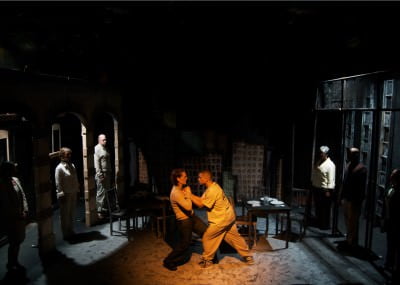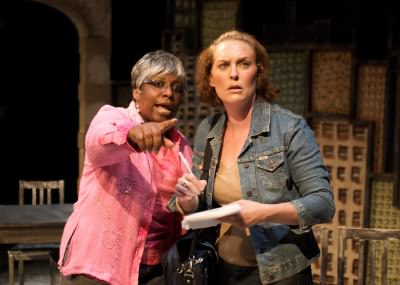Under America
Written by Jacob Juntunen
Playing at Anthaneum Theatre
Under America Under Achieves
Too many misleading facts and far too many themes in Under America pull Juntunen off track, and an important local message never gets told. The story is filled with drama, jumping from reality to fantasy, but it in trying to fit everything in, the story gets lost and each conflict is left one dimensional.
The story focuses on the perspective of two Chicagoland families, a black family living in Cabrini Green and a white suburban family living in Lake Forest. The daughter, Sam (Stephanie Stroud,) from Lake Forest is now living in Chicago’s wealthiest neighborhood, Gold Coast, and working for the Chicago Tribune (a job her politician father got her.) Sam is a bleeding-heart liberal filled with white guilt and determined to make a difference with her stories. Assigned a series covering the gentrification of Cabrini Green, Sam is set on shedding a positive light on the history and living situation inside the housing project.
Juntnen’s viewpoint on life in the housing projects may be correct, but his facts are so inconsistent and wrong, that it destroyed the power of his message. The life in Cabrini Green was not beautiful and safe for long once the projects were constructed. There was a strong sense of community and neighborly help, but lack of funding and over crowding created major health and safety problems along with an abundance of criminal activity very shortly after the projects were built. The projects that were built by former Mayor Daley were under funded and pushed aside, and that is part of the story that shouldn’t be ignored. As the Michael in the play would say, they were made dirty from the beginning, by us. Facts given while trying to draw empathy from the audience for the youngest son within the family in Cabrini Green are too unrealistic. 5 ounces of marijuana… come on. That is easily enough to roll over two hundred blunts. An innocent dealer is not walking on the side walk with that amount, nor is that amount for personal use (Although, I do believe that Marijuana should be decriminalized all together.) It is a fact that people in that area are profiled and over proportionately imprisoned, leaving kids with criminal records for petty nonviolent crimes and unable to pursue jobs and college like kids in the surrounding neighborhoods, but when trying to get that message across to anyone other than preaching to the choir, facts that are stated have to be correct. The real problem is that kids are incarcerated for small amounts, and their life changes for the worse due to the unjust jail time.
The play is filled with potential, but does not connect with the audience. The first act is a group of slow character building scenes with common clichés about the inequities between races and classes in Chicago. Sam is out of touch and too naive for me to relate to. The two families represent the extremes of society. The white family living in the North Shore is so out of touch, you would think that they have never conversed with a black man or woman, which makes for some funny lines, but not a sense of reality. The mother’s closed minded attitude, yet still up on her high horse, epitomizes the people in our society that disgust me, but is terrific in bringing out the subtle racisms and judgment that exists in too many homes. She is played beautifully by Annie Silvinski, adding so much dry humor to her character with lines such as when she complains about her undiagnosed chronic fatigue, and taking her cat’s valium. The deepest character on stage is the eldest brother, Abe (Sentell Harper,) but still lacked the duelality that exists when being torn between trying to be responsible for yourself and move towards your own personal goals and that to take care of your family and community.
Act two greatly improves, moving away from redundant character building and into a unique plot, moving between Sam’s experiences with Cabrini Green, Michael’s (Jon Sharlow) time in jail and the fantasy life that exists in your darker thoughts at night in these situations. The problems occur when several subplots are introduced, like the Sam’s relationship with her girlfriend and her parent’s acceptance of her sexuality. Other themes such as the connection between prisons and labor camps are fit for great plays, but distract from any one theme having an impact.
By the end of the long play, too many themes have been introduced. It is as if the author sat down with a checklist and marked off each dramatic conflict as he added it into the script. Under America hits on racism, classism, sexual identity, love, family responsibilities, local politics, prison reform, gentrification, censorship, hopelessness, the harms of liberalism as well as the desperate need for liberalism voice to be heard, and many more. Look up great play conflicts, and they are all in this play.
Under America has potential to be a strong dramatic play with an important message behind it, but it gets lost in its attempt to do too much. Characters seem out of touch with the reality, and therefore lack a connection with the viewer. In a long play, the cast does a fine job performing and this play holds a lot of potential, but it needs work. The drama is there, but the focus is not.
Not Recommended
Timothy McGuire
For full show information, check out the Under America page at TheatreInChicago.
At Anthenaeum Theatre, 2936 N. Southport, Chicago 60657, runs September 3 – 26th, Thursday-Saturday at 8pm, Sunday at 2pm, tickets are $20 (discounts available for seniors, students, groups and industry) call 1-800-982-2787.
Editor’s Note: I was a Chicago Police officer assigned to Cabrini Green (1973-75) and I witness a murder, was shot at several times and I experienced the filthy conditions of those Projects. Therefore, I could not possibly be impartial to Juntunen’s play. If he had seen the terrible conditions and the utter disregard for human life that I witnessed, his play would have been written differently, I’m sure. I have decided to not review the work since my memories of that place still produces nightmares. I do believe that Under America tries to cover too many themes.
Tom Williams





Tim–
Slow pacing? Over complication? There are arguments to be made.
What you might want to label fuzzy facts, however, I would call unreliable narrators.
This show is SO BAD I left after the second act. Wanted to leave after the first act but tried (REALLY REALLY TRIED) to give it a shot. From staging (ENOUGH WITH MOVING THE TABLES AND CHAIRS!!!) to writing to acting, it was terrible! Would rather be water-boarded (which I felt at this play, only the show used it’s “message” instead of water) then sit through this again. To say, NOT RECOMMENDED, is being kind.